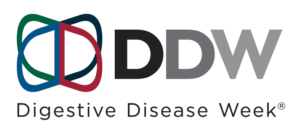Cookie Statement
This Cookie Statement explains how Digestive Disease Week® (DDW) (collectively “DDW”, “we“, “us“, and “ours“) uses cookies and similar technologies to recognize you when you visit https://ddw.org or any website, mobile application or other online property owned, operated or controlled by us (“Sites“). It explains what these technologies are and why we use them, as well as your rights to control our use of them.
What are cookies?
Cookies are small data files that are placed on your computer or mobile device when you visit a website. Cookies are widely used by website owners in order to make their websites work, or to work more efficiently, as well as to provide reporting information.
Cookies set by the website owner (in this case, DDW) are called “first party cookies.” Cookies set by parties other than the website owner are called “third party cookies.” Third party cookies enable third party features or functionality to be provided on or through the website (e.g., advertising, interactive content and analytics). The parties that set these third-party cookies can recognize your computer both when it visits the website in question and also when it visits certain other websites.
Why do we use cookies?
We use first party and third-party cookies for several reasons. Some cookies are required for technical reasons in order for our Sites to operate, and we refer to these as “essential” or “strictly necessary” cookies. Other cookies also enable us to track and target the interests of our users to enhance the experience on our Sites. Third parties serve cookies through our Sites for advertising, analytics and other purposes. This is described in more detail below.
The specific types of first- and third-party cookies served through our Sites and the purposes they perform are described in the table below:
| Types of cookie | Who serves these cookies | How to refuse |
|---|---|---|
| Essential website cookies: These cookies are strictly necessary to provide you with services available through our Sites and to use some of its features, such as access to secure areas. |
| Because these cookies are strictly necessary to deliver the Sites to you, you cannot refuse them. You can block or delete them by changing your browser settings as described below under the heading "How can I control cookies?" |
| Performance and functionality cookies: These cookies are used to enhance the performance and functionality of our Sites but are non-essential to their use. However, without these cookies, certain functionality may become unavailable. |
| To refuse these cookies, please follow the instructions below under the heading "How can I control cookies?" |
| Analytics and customization cookies: These cookies collect information that is used either in aggregate form to help us understand how our Sites are being used or how effective our marketing campaigns are, or to help us customize our Sites for you. |
| To refuse these cookies, please follow the instructions below under the heading "How can I control cookies?" |
| Advertising cookies: These cookies are used to make advertising messages more relevant to you. They perform functions like preventing the same ad from continuously reappearing, ensuring that ads are properly displayed for advertisers, and in some cases selecting advertisements that are based on your interests. |
| To refuse these cookies, please follow the instructions below under the heading "How can I control cookies?" Alternatively, you can adjust your Google ad preferences online. |
What about other tracking technologies, like web beacons?
Cookies are not the only way to recognize or track visitors to a website. We may use other, similar technologies from time to time, like web beacons (sometimes called “tracking pixels” or “clear gifs”). These are tiny graphics files that contain a unique identifier that enable us to recognize when someone has visited our Sites or opened an email that we have sent them. This allows us, for example, to monitor the traffic patterns of users from one page within our Sites to another, to deliver or communicate with cookies, to understand whether you have come to our Sites from an online advertisement displayed on a third-party website, to improve site performance, and to measure the success of email marketing campaigns. In many instances, these technologies are reliant on cookies to function properly, and so declining cookies will impair their functioning.
Do you serve targeted advertising?
Third parties may serve cookies on your computer or mobile device to serve advertising through our website. These companies may use information about your visits to this and other websites in order to provide relevant advertisements about goods and services that you may be interested in. They may also employ technology that is used to measure the effectiveness of advertisements. This can be accomplished by them using cookies or web beacons to collect information about your visits to this and other sites in order to provide relevant advertisements about goods and services of potential interest to you. The information collected through this process does not enable us or them to identify your name, contact details or other personally identifying details unless you choose to provide these.
How can I control cookies?
You have the right to decide whether to accept or reject cookies. You can exercise your Google cookie preferences by clicking on the opt-out link provided in the cookie table above.
In addition, you can set or amend your web browser controls to accept or refuse cookies.
In addition, most advertising networks offer you a way to opt out of targeted advertising. If you would like to find out more information, please visit http://www.aboutads.info/choices/ or http://www.youronlinechoices.com.
How often will you update this Cookie Statement?
We may update this Cookie Statement from time to time in order to reflect, for example, changes to the cookies we use or for other operational, legal or regulatory reasons. Please therefore re-visit this Cookie Statement regularly to stay informed about our use of cookies and related technologies.
The date at the bottom of this Cookie Statement indicates when it was last updated.





